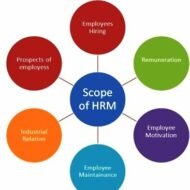Posted by Managementguru in Business Management, Human Resource, Organisational behaviour, Principles of Management
on Mar 13th, 2014 | 0 comments

Scope and Characteristics of HRM 1. Personnel aspect: concerned with manpower planning, recruitment, selection, placement, transfer, promotion, training and development, lay off and retrenchment, remuneration, incentives, productivity, etc.; 2. Welfare aspect; dealing with working conditions and provision of amenities such as canteens, crèches, rest and lunch rooms, housing, transport, medical assistance, education, health, safety, recreation facilities, etc.; and 3. Industrial Relations aspect: the legal part which covers union-management relations, joint consultation, collective bargaining, grievance redress and disciplinary procedures, settlement of disputes, etc. Small Business Management and Marketing Essentials CHARACTERISTICS OF HUMAN RESOURCE MANAGEMENT: 1. It is an art and a science: The art and science of HRM is indeed very complex. HRM is both the art of managing people by recourse to creative and innovative approaches; it is a science as well because of the precision and demanding application of theory that is required. 2. It is pervasive: Development of HRM covers all levels and all categories of people, and management and operational staff. No discrimination is made between any levels or categories. All those who are managers have to perform HRM. It is pervasive also because it is required in every department of the organisation. All kinds of organisations, profit or non-profit making, have to follow HRM. 3. It is a continuous process: First, it is a process as there are number of functions to be performed in a series, beginning with human resource planning to recruitment to selection, to training to performance appraisal. To be specific, the HRM process includes acquisition (HR planning, recruitment, selection, placement, socialisation), development (training and development, and career development), utilisation (job design, motivation, performance appraisal and reward management), and maintenance (labour relations, employee discipline, grievance handling, welfare, and termination). Second, it is continuous, because HRM is a never-ending process. 4. HRM is a service function: HRM is not a profit centre. It serves all other functional departments. But the basic responsibility always lies with the line managers. HRM is a staff function – a facilitator. The HR Manager has line authority only within his own department, but has staff authority as far as other departments are concerned. 5. HRM must be regulation-friendly: The HRM function has to be discharged in a manner that legal dictates are not violated. Equal opportunity and equal pay for all, inclusion of communities in employment, inclusion of tribal’s and farmers in the benefits and non-violation of human rights must be taken care of by the HRM. 6. Interdisciplinary and fast changing: It is encompassing welfare, manpower, personnel management, and keeps close association with employee and industrial relations. It is multi- disciplinary activity utilising knowledge and inputs from psychology, sociology, economics, etc. It is changing itself in accordance with the changing environment. It has travelled from exploitation of workers to treating them as equal partners in the task. 7. Focus on results: HRM is performance oriented. It has its focus on results, rather than on rules. It encourages people to give their 100%. It tries to secure the best from people by winning the whole hearted cooperation. It is a process of bringing people and organization together so that the goals of each are met. It is commitment oriented. 8. People-centred: HRM is about people at work both as individuals and a group. It tries to help employees to develop their potential fully. It comprises people-related functions like hiring, training and development, performance appraisal, working environment, etc. HRM has the responsibility of building human capital. People are vital for achieving organizational goals. Organizational performance depends on the quality of people and employees. 9. Human relations philosophy: HRM is a philosophy and the basic assumption is that employees are human beings and not a factor of production like...


